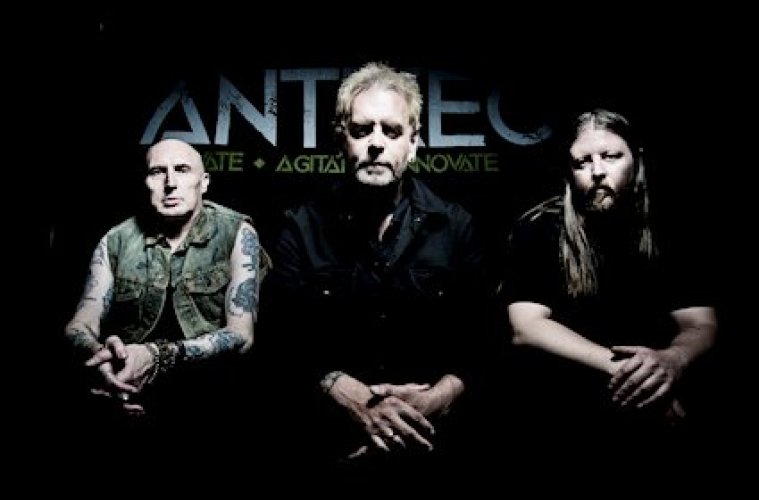
Back in the day, ANTISECT were one of those bands you’d call now a game changer. From 1981 to 1987 having released just two records they set the course for many things to happen in punk and freedom fighting movements. You could easily place “In Darkness There is No Choice” (1984) on your milestones-of-punk shelf and their personal involvement in pro animal rights direct actions was an inspiration to many. “Out From The Void” EP (1985) announced a change in style setting foundations for what we all know now as crust. Soon after that the band stopped, leaving their legacy to future generations of punks. 2011 brings ANTISECT back on stage and with a few one-off gigs here and there they enter the studio to record their second full length album after 33 years, entitled “The Rising of The Lights”. For some this album is not real ANTISECT, for others it is a natural continuation from where they left off. For us it is a good chance to talk to Pete Lyons (Lippy) about past and present of ANTISECT and the world we happen to live in.
This interview also appeared in CHAOS W MOJE GLOWIE #18 in print.
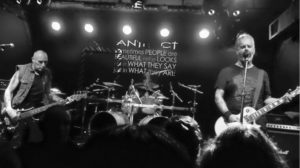
SP: When I put my hands on the fresh new copy of The Rising of the Lights I was surprised to find there a booklet full of your writings. Having read all that I see a still angry middle aged man full of ideas and ready to act. Are you?
Pete: Well, I have my ideas, the same as most people. I guess doing this LP after all this time gave me the opportunity to redefine my thoughts. Most of the anger I had in me when I was younger is still very much there. It’s just now represented in different ways. I think time has taught me value of communicating the reasons for that anger, rather than having it manifest in ways that are likely to provoke negative reactions from those that might not understand where I’m coming from.
SP: I guess this action is or will be different to the one you took part in 20-30 years ago but do you think the new ANTISECT album can spark other actions and what could they be?
Pete: I hope so. But it’s really out of our hands. I’m not sure I think the political end of the “punk rock” scene is as inspirational as it was. Of course there are people doing some great things, but overall it seems to me to have stagnated a bit in the time between where we first left off and where we are now. Maybe I expect too much, but I don’t see the progression that I think 30-odd years should have delivered. I guess it could be that some people have taken the ideas and ethics that existed back then and moved beyond the ‘punk rock’ scene, and if that’s happened then that’s cool, but there’s definitely a less politicised vibe around the events that we’ve played at. The emphasis these days seems to be more about the music. Not saying that the music isn’t important. Of course it is, but what inspired me about this whole thing, and particularly the anarcho side of it, was the fact that it also had an attitude of being a catalyst for social change. If we can somehow play a part in restating that emphasis then I’ll be happy that we’ve helped to push things in a positive direction.
SP: Reading your thoughts on where you and me and the rest of humanity should go and how we should get there I would compare your anarchy to my anarchy which I call leaving the system, abandoning it. Would you agree that no system is prepared for us leaving it but is prepared for us fighting it so the new revolution should be abandonment rather than force?
Pete: Well, I don’t believe that the use of force in the context of realigning our society can ever really be the answer. Forcing someone to do something assumes that they either don’t understand or don’t agree with what’s been asked of them in the first place. I do think that we mustn’t forget that, as clichéd as it sounds, we actually are all a part of a global community and so it’s impossible to abandon it in that way. The problem I see with us abandoning the political systems that are in place now is that those systems make no allowance for the possibility that less and less people will participate in those political processes. They don’t care if only 60% of the people vote in a supposed “democracy”. It just means that the views of the other 40% aren’t taken into account. The rule is that if you don’t take part in the political systems that currently exist, your views will be ignored because you haven’t represented them in the “right” way. The problem is, how can I justify taking part in something I don’t believe in in order to change it into something I do? It’s a weird one. The emphasis ends up being more on the side of the philosophical arguments rather than the practical ones. This might have been more workable in past times, but now, with the extent to which the world has embraced capitalism, and the way that those who pull the strings exist far beyond the constraints of traditional nation states, it makes the urgency for dissenting voices to be heard ever more necessary, and I think that expressing those views in whichever ways we can is the way forward. Trying to make the world a better place using the established political systems is just as valid as trying to make it a better place by attempting to do it outside of them. As much as I’d prefer to represent the more philosophical view, these days I just don’t think we have the time left to look at it purely like that. I still can’t bring myself to vote though. And maybe that’s what drives me more into putting my views forward in the context of the band.
SP: So you don’t vote?
Pete: No. I have a problem with participating in a political system that I don’t believe in. (What’s called “Democracy” in the UK is not that anyway). I have considered it though, but the way the voting system works in the UK has meant that wherever I have lived, the voting patterns of the area have been such that my vote would never have made a difference to the outcome in that area. The constituencies have always been very left leaning and though they don’t fully represent my views, there haven’t been any other candidates that have stood a realistic chance of being elected that I would have voted for anyway.
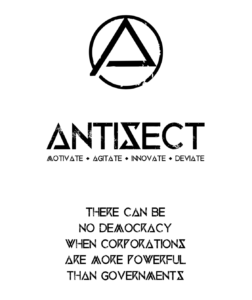
SP: Now, many people would ask: so how do we put our dreams of life of equality with no animal and earth exploitation into action? Easy said, but with our burden of hundreds of years of life in this civilisation it is extremely difficult to translate this into mass action of equally minded people. Don’t you think people nowadays live separate lives with their heads in their mobiles and things happening there are more important that what is happening behind the window, not to mention any change on a more global scale? How are we going to get our views over to them?
Pete: Ultimately, it’s an individual thing, isn’t it? And I think in order to remain true to the kind of anarchist philosophy I believe in it’s a process of winning the arguments and turning the tide of opinion that way. It’s also about being informed, or even wanting to be informed. Like I say in the book, when we figure that to carry on doing things in the ways we have been will no longer benefit us, we will begin to explore other ways of behaving. Unfortunately we face a huge problem right now though, and that is, by the time the effects of, for example, climate change, become obvious to everyone, it may well be too late for any change in attitudes to have an influence on what will happen anyway.
SP: Would you recommend any other further reading to those interested in the subject, that would like to go beyond your thoughts in the booklet?
Pete: I dunno. I’m not as much of a reader as I used to be, or would like to be. I have this shit habit of starting something, getting halfway through it, then seeing something else that interests me so I’ll put the first one down and start on the new one. I’ve got an ever increasing pile of half read books and although one day I do intend to put the time aside to finish them all, I’m just not sure when that time will come. These days I tend to read a lot of stuff online. Things move so fast now that by the time a lot of stuff gets to print, it’s become outdated by more recent events. A few recently half read books of mine have been Noam Chomsky’s “Media Control” and “Who Rules the World”, “Radicals” by Jamie Bartlett, Owen Jones “The Establishment – And How They Get Away With It”. One book that did have a lasting influence on me, and not just because I was out of my face on acid when I first started reading it, was “Zen and the Art of Motorcycle Maintenance” by Robert Pirsig. I’ve never been that into the more traditional anarchist writings. Partly down to laziness and partly because I find that, although I agree with the essence of a lot of it, there are other parts that don’t think translate that easily into the realities of the modern day. Also though, my views on stuff tend to be very simplistic, as I think that we have a tendency to complicate arguments that are often very fucking basic when it comes down to it.
SP: So why do you swear so fucking much? A habit or a means to release your emotions?
Pete: I try to write how I talk. Not so much in the lyrics but definitely in the book and in the handouts. Obviously there are times when I adapt how I speak if I think that my language might not be appropriate for the company I’m in. I can be pretty eloquent on occasion, but I come from a very working class, Irish background where swearing was just part of our language. Not in a huge way. It wasn’t, “fucking this” and “fucking that” round the dinner table, but we didn’t shy away from the odd so called “bad” word. I also think that swearing is a valid part of our language and it’s weird that some folks should think it’s offensive. I hear people say things that to me are far more offensive than any so called “swear” word.
SP: Have you considered becoming a writer?
Pete: I enjoy writing. It’s a kind of self therapy I guess. It also helps me focus and think a bit more deeply about stuff. In the context of the band, I do it to try and elaborate on the ideas behind the lyrics. If I had the time I probably would write more. Whether or not that would make me a “writer”, I dunno.
SP: What made you come back to playing as ANTISECT after such a long break? What was the breakthrough here?
Pete: When we split it wasn’t because I didn’t want to do it. It was because the circumstances at the time just made it impossible to carry on. People were spread out all over the country. Some squatting, some travelling. The scene had become really fragmented. After we split I got into engineering and producing and would regularly cross paths with people who would suggest that we do it. It just never seemed like the time was right though. Plus, if I’m honest, there were various reasons why I just wouldn’t have wanted to work with some of those who had previously been in the band again. I’d had a few conversations with Laurence, our last bassist about doing some stuff, but it was always a bit vague and it never seemed like we would have the time to devote to it. Life takes over, people have families, jobs, responsibilities we just didn’t have the first time round. Eventually, we found a clear space and that coincided with being asked to reform for a one-off festival show in the USA. I took some time out to go and see various people to find out if they would want to be involved in doing something, and out of that it seemed that to go to the lengths of rehearsing a set for just one show seemed a bit stupid so it kinda snowballed from there. We didn’t actually make the US show that year (Chaos in Tejas), and the first one turned out to be Puntala in Finland.
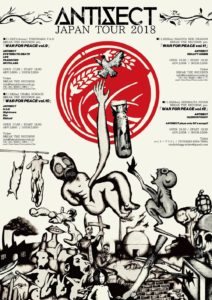
SP: Since the reformation in 2011 there have been a few line-up changes until you decided not to have a stand alone vocalist. What was the main reason for that and for Pete’s leaving ANTISECT?
Pete: For the most part it was down to people’s commitments outside of the band. People have other priorities and we had to respect that. In the case of Pete Boyce it was different. When I first went up to see him to talk about the possibility of him being in the reformed lineup I did feel that he wasn’t the same guy that I had known all those years ago. Basically, the Pete that I knew back then was a pacifist, vegetarian/vegan. Whereas the Pete of 2011 was now a meat eater with one or two other habits that, let’s just say were very different from how I remembered him. I guess I hoped though that the fact that he did seem to want to do it again would effect him in a way that would help us realign once more. I got that one badly wrong. In the short time he was with us the differences between him and the rest of us became more and more obvious. As time went on it became really difficult to support some of his views, particularly in the context of this band. And without wanting to go too deeply into the reasons why, if he hadn’t have chosen to jump ship when he did, I think we would have asked him to leave in any case. As to why he left – that’s not really for me to say but I suspect he may have felt the mood of the others and possibly anticipated what might be to come. I dunno.
SP: Who is Joe Burwood, your drummer? How did you start working together?
Pete: Joe is someone I’d known for a few years. He’d been involved in several sessions at my studio in London and worked there for a short while also. As well as being an excellent drummer, he’s actually a really talented guitarist. (And shows me up for the cack handed amateur that I actually am) When Laurence and I were discussing reforming there were a few possibilities of who to try out as a drummer. I’d long lost touch with our original drummer, (another Pete) and when I’d worked with Joe previously I really liked the energy he brought to whatever he was doing so I asked him, he said yes and the rest is history.
SP: So, how well is The Rising of the Lights doing in terms of sales and what is the response you get from people? Is it from one extreme to the other, from those radical punks who hate it saying it is not ANTISECT anymore to younger generation of people who dig post punk and post metal stuff and take it as a completely new band?
Pete: No idea. We’ve been too scared to ask. I’m pretty sure that the physical sales have been dented by the fact that we’ve made it available to stream online for free from day 1. That was always the plan though and we’re really grateful to Rise Above for being open to that. The response has been pretty much what we expected. Plenty of folks who think we should sound similar to how we did 30-odd years ago and plenty of others who get what it is we’re doing now and are into it. The weird thing is that it’s not actually that different from how we were sounding before we split. Sure, there are a few developments here and there, but there are plenty of chunks of it that originate from 1986 so to suggest it’s somehow not representative of the Antisect of old is just plain, fucking nonsense. I guess a lot of people only have the “In Darkness…” album to go by when they make their decision about what they think Antisect “sound like” but the fact is that era represented only a small part of the band’s original career. Almost as soon as that LP came out we began to get heavier and although the production was pretty simple, the “Out From The Void” EP should have been a pretty clear sign of where we were going. Some people appear stuck in what was their “golden era” though, and seem unable to accept that things change. I’ve got nothing against those who prefer the music of the 1980’s or whenever, but time moves on and I think it would be wrong if what Antisect do these days didn’t represent that.
SP: What was the main reason for signing with Rise Above Records? Were there other labels interested? Are you satisfied with the co-operation so far?
Pete: We had originally wanted to put it out in as much of a DIY way as we could. We were discussing various plans with Jon at Active Distribution about how we could do this and although in one sense the idea of releasing it like that would have held more faith with the “punk rock/anarcho” ethic, we eventually came to the conclusion that the whole point of doing something that was basically expressing radical ideas needed to find an outlet amongst those who had less likelihood of being previously exposed to those ideas. The thought of a limited release that might travel no further than the “punk rock” community just seemed a bit reductive. It’s a big, wide world out there and we wanted to push it out there. Rise Above seemed the perfect label in that respect. Lee (Dorrian) was an old fan of the band from back in the day who knew what we were about and there was a level of mutual respect there that just seemed to make it perfect sense to bring it out with them.
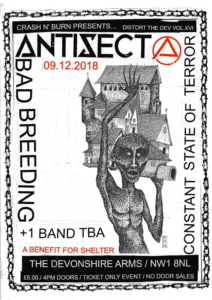
SP: How important are the politically charged back projections during your shows? Do you believe your show would lose on the message if these were not projected?
Pete: Very important. As I see it, they’re a vital component of what Antisect is about. They give us the opportunity to express things in a way that can be very easily understood. It’s not always possible to use them due to the various technical limitations of whichever venue we might be playing at, but we will use them as often as we can.
SP: Reading your punk stories from the old days one has an impression that it was all down to the people who made it happen and shared time and space with you. Do you still have the same impressions about your life, ANTISECT and punk today when you tour and play? Do you feel you are part of a community/movement?
Pete: It’s weird. Maybe it’s just weird being older. I dunno. In some respects I feel part of a community but I do feel a bit detached from the nihilism that seems to exist within parts of it. The “punk rock” world contains a pretty broad spectrum of folks. Apart from the very, very early days (and I’m talking the late 70’s here) there have been various different strands of what we call “punk rock”. Some of whom I feel very little sense of alignment with and others who I’ve come to regard as being very dear friends. The single most vital thing that I think “punk rock” taught me was that if you didn’t like something then it was up to you to try to change it. Don’t wait for others to do it for you. That was the thing that inspired me to form a band in the first place and it was also the idea that helped move me into more involved levels of personal politics. It feels to me that, despite the fact that there are still people out there who view things in a similar way, the emphasis on stuff like that is not as strong as it has been in the past and I get the sense that the inspiration to evolve that into a progressive community has faded a little. The thing is, as I see it, with the levels of shit that’s going on around us in the world right now, it seems that there has never been a more vital time to involve ourselves in the force for change.
SP: In one of the interviews you mentioned that you are not as proactive on the subject of direct action towards animal abusers as you used to be in the past but you still hold the same opinions and beliefs. Do you think this comes with age (less action) as a rule of thumb or is it an individual matter?
Pete: Yes, I still hold the same basic beliefs. No. I’m not as involved in direct action as I used to be. I came very close to the edge with that kind of stuff that I felt I had to back off from it. A lot of people I know spent time in prison for their involvement in some of the things we did back then and when that started happening I felt that my time would be better spent out of prison than inside it. There was at the time, and I’d be surprised if there wasn’t still, a lot of people involved in those circles who seemed unable to look outside of their feelings for animal welfare though. My thing has always been that my view on animal rights was just one part of a whole outlook on life. One that encompassed how humans treat each other also. Yet, I would continually find myself in situations where it would seem that to some people in the animal rights movement, the welfare of humans could be thought upon as being secondary in the defence of animals. Of course, it’s an emotive subject. But, as much as I disagree with our general attitudes towards other species, I don’t think it’s right to allow ourselves to disregard the welfare of other humans in our attempts to change how we treat them. I think that’s wrong both ethically and practically. It should come as no surprise that most people in the mainstream think of animal rights activists as cranks and weirdos, because the arguments are often compromised by how we present them. When we present our case in a purely emotional way, we allow those who hold the opposing view to dismiss what we say as being based on that alone. Whereas I think that aside from the emotional side, the practical and ethical arguments are strong enough to stand on their own merits. This isn’t an opinion I’ve formed through age. It’s something I felt even during my more extreme involvement.
SP: Coming back to the old days, if I may, what were the main activities of ANTISECT apart from being a band that played gigs? Squatting, direct action (what?), protests? Was anything regular and organised or did you rather take part in one-off activities?
Pete: In the early days we were very much finding out what it was all about. I was turned on to the more seriously political side of “punk rock” by the band Crass. Up till then any politics I had were pretty basic really. All of us, with the exception of Wink (bassist) took part in a lot of the anti-nuclear demonstrations in the UK in the 80’s. Particularly those at the military air bases – Upper Heyford, Lakenheath, Greenham Common in the early days. Some of us were a part of the first “Stop the City” actions. (I was arrested at the first one). One or two of us were active hunt and hare coursing saboteurs. I was involved in a group who took part in several other “activities” around battery farms, fur farms, pharmaceutical companies and the like that are probably best not gone into here. Later on, shortly after the band had relocated to London, Polly (drummer) and I squatted in the East End while Tim (singer) and Laurence (bassist) took to the road to become part of the traveller community. It’s probably a bit silly to say so, but one of the most fun days of my life was at what became known as the “Poll Tax Riot” in London in 1990. It was one day where it really did feel like everyone there was united against what was going down and the authorities just seemed totally unprepared for the depth of feelings that were present. In contrast I went along to the anti-Trump protests in London earlier this year and they were so fucking lame and sanitised it was almost dispiriting in a way.
SP: ANTISECT’s Leeds 2.4.86 album brings back the memories of the old days of the band, released by Antisociety. Was it released with your permission or you don’t care? What is your opinion about live bootlegs? Anything against as a band?
Pete: It was put together before I knew about it, but to be fair to the guy who ran the label, he did eventually come to me and I didn’t have any objections. It also meant that we received a small amount of money that helped finance the band when we first reformed. I’m aware that folks want to hear some of that stuff. My only reservation is that some of the live stuff that’s floated around just sounds a bit shitty to my ears, but I guess they’re a fair representation of what it was like back then.
SP: What were the individual members of ANTISECT doing since you split up in 1987? What do they do now, have you got any knowledge, contact with them?
Pete: If you mean the people that were in the band when we split up, Tim, Laurence and I kept in touch throughout the whole time and I still regard them as being very dear friends. I heard Polly moved to Scandinavia. The rest, I had long lost touch with, as, for various reasons, our relationships pretty much ended with their departures from the band. I’d also kept in touch with John (Out from the Void bassist) as, aside from a few “lost years”, we’ve always had pretty close relationship.
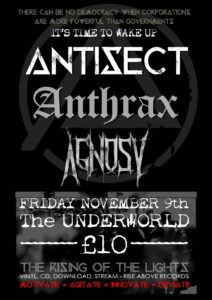
SP: Who runs The Antisect Unofficial facebook page? To the general public eye it looks like some personal matters haven’t been settled within the founding members of the band.
Pete: I understand it was put together by Pete Boyce shortly after he quit the band again in 2012. Yep. There are some issues that have remained outstanding on both sides for a bunch of years now. I took an interest in it to begin with, just to read what he had to say, but it quickly seemed to become a vehicle for some kind of weird personal obsession he appears to have with me and the band as it is today so I don’t bother with it these days. I think, when you consider the fact that neither he, nor anyone else who might have been in the band from way back when, ever made any attempt to reform or reinstate anything in all the time between when we split in 1987 and when I decided to do something in 2011 it’s a pretty clear indicator of who actually did what. The guy seems to assume a very disproportionate sense of ownership considering the level of involvement he had during both his brief times in the band. With regards to the other stuff, well, I’ve always been a fairly easy guy to contact if the need is there. I wrote to all involved very early on, and suggested that if they had a problem with anything, I would be quite happy to meet up with them individually to discuss both sides of whatever disagreements there might be. Nobody ever took me up on that.
SP: How do you view the “In Darkness, There is No Choice” record now? Have you ever thought about it as the sign that directed people, bands, punk in general?
Pete: I think I’d say I appreciate it rather than I enjoy it these days. I do think it’s very much of its time, but it represented what we were back then, and in that sense I’m still kinda proud of it. Looking back at it now I can see that it was a bit different from a lot of the stuff that was going around at the time. We didn’t realise then that it was though. You just do your stuff, don’t you? Having spent most of my life in recording studios since then, sonically there are things that, given what I know now, I would have liked if they had been done differently, but what the fuck! It is what it is, and that’s how it should be I guess. It wasn’t the only thing out there that offered direction though. I’ve already mentioned Crass, but there were plenty of other people with similar ideas. Maybe we got more involved than most, but it was all there in that time.
SP: What do you feel when you see all those punks, young and old, still wearing the Antisect backpatches with old art and logo?
Pete: Well it’d be weird if I said I didn’t like it. I do. Of course I do. It’s humbling to know that we can make a difference, however little, to the way people express themselves. And it’s very cool to think that other generations have been turned on to what the band is about. Much the same as with the music, for most people up until now, the older logos and artwork is all that they’ve had to associate with us so it’s no surprise to see that that is most of what’s out there.
SP: What is you current setlist for gigs like? How many of the old songs do you still play?
Pete: We tend to change it up every once in a while. What we try to bear in mind is that the songs from “In Darkness…” and “Out from the Void” have been around for over 30 years, so a lot more people have had the chance to become familiar with them than the stuff from “The Rising of the Lights” for example. Sonically, we’ve tried to include the songs that seem to fit with all the different eras, so yeah, it’s a bit of a mix of everything.
SP: Among the founding members of the band I can see typical Polish surnames, Paluskiewicz and Rokicki. Any knowledge if they have Polish roots and where they go?
Pete: Yep. They both have Polish roots. I know Polly’s father, at least, was Polish (Pauluskiewicz) and I think both of Wink’s parents (Rokicki) were too.
